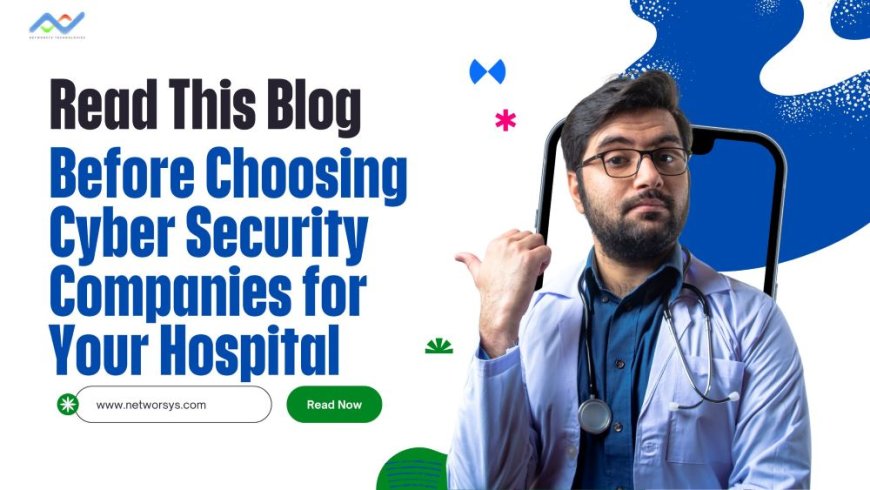Read This Blog Before Choosing Cyber Security Companies for Your Hospital
As such, this blog’s goal will be to identify the best cybersecurity companies as well as solutions that focus on the protection of your hospitals.

In today's world of digital technology, healthcare and hospitals have to contend with an increasing risk of cyberattacks. From ransomware to data breaches, the results of a successful hack could be catastrophic, threatening the patient's care, damaging sensitive information, and inflicting significant financial and reputational damages. As healthcare becomes an increasingly popular attack for cybercriminals, hospitals should prioritize strong cybersecurity strategies and collaborate with the most reliable cybersecurity company for hospitals.
Importance of Cybersecurity for Hospitals
The healthcare sector has for a long time been a target of cybercriminals and the situation has only grown worse over the last few years. According to the UpGuard report, the healthcare industry is subject to one of the largest volumes of cyberattacks, and there is the possibility of more severe breaches coming. The report highlights a few prominent breaches of data that have affected millions of patients. These include those that affected the Community Health Systems breach that affected 4.5 million people, as well as the UCLA Health breach that compromised the information of a comparable amount of patients.
The attacks had a catastrophic impact on healthcare facilities, which forced them to cease vital operations, redirect resources, and handle the aftermath of compromised patient information. It was revealed at the Cybersecurity Conference in Monaco revealed that the main threat to hospitals is interruptions to business operations which is usually in the form of ransomware-based attacks that lock down their systems of information. This apprehension has led hackers to attack hospitals, and some have even made a profit from the attacks.
The Importance of Robust Cybersecurity Measures
To protect themselves from this increasing security threat, healthcare facilities need to be proactive in implementing complete security measures. The article Medical Buyer article highlights that those who are compromised should be able to share information with other institutions in the industry in order to stay aware of any new vulnerabilities and threats. This collaboration is essential to strengthen the overall security.
The Cybersecurity conference in Monaco highlighted the importance of adhering to the basic cybersecurity best practices including the use of antivirus software as well as endpoint detection and response (EDR) solutions and firewalls. It is worth noting that the French National Agency for the Security of Information Systems (ANSSI) has released a complete guide detailing the top 42 security guidelines that every business, such as hospitals, should adhere to in order to improve their security posture.
These guidelines cover a broad variety of subjects, such as the training of operational teams on the security of the information system, increasing the awareness of users about the fundamentals of computer security, identifying and securing the most sensitive data and servers, and also encrypting sensitive data that is transmitted via the internet. Following these rules, hospitals can be protected from the most cybersecurity threats that they encounter.
How to Choose the Best Cybersecurity Company for Your Hospital
With the growing difficulty of cyber-attacks and the crucial necessity of protecting patient information hospitals need to select an expert in cybersecurity who will provide comprehensive and custom solutions. When considering potential providers, There are a number of important elements to be considered:
- Industry expertise: A cybersecurity expert should be able to comprehend the intricacies of the specific demands and challenges in the health industry. They must be knowledgeable about the most recent security threats, regulations, as well as best practices for healthcare, and can design and implement a solid security strategy.
- Comprehensive Security Solutions: The provider must offer a range of security solutions integrated to cover the entire spectrum of cybersecurity requirements, from incident detection and threat detection to data security and compliance. This comprehensive approach will ensure that all elements that comprise the digital environment of the institution are protected.
- A customized approach: Each institution has distinctive operational requirements, data assets as well as risk profiles. The cybersecurity provider should be in a position to tailor their solutions according to the particular requirements of the hospital, making sure that the most important areas are protected and prioritized.
- Recovery and Incident Response: In the case of a successful cyberattack, the hospital should have a solid incident response plan as well as the ability to quickly stop the breach, limit the harm, and then restore normal operations. The ability to assist in recovering from an attack is essential.
- Continuous Monitoring and Improvement: Cybersecurity is a continuous problem, and the service must provide continuous security monitoring and intelligence and periodic security assessments to spot and correct new security vulnerabilities. This proactive approach can help hospitals keep ahead of the curve and maintain a robust security position.
- Experience in Compliance and Regulatory Expertise: Healthcare institutions are subject to stringent legal requirements, including HIPAA, which governs the protection and handling of data from patients. The cybersecurity partner must be knowledgeable of these regulations and be able to help the hospital ensure compliance while minimizing the risk of expensive fines and penalties.
- Flexibility and Scalability: As hospitals expand and develop, their cybersecurity requirements may evolve. The service provider must be able to scale their solutions to meet the demands of the hospital and ensure that their security measures work throughout the years.
- Reputation and Track Record: When choosing a cybersecurity provider it is important to look at their credibility, reputation in the industry and their experience of successful implementations within the healthcare industry. This can give valuable insight into their capabilities as well as the high quality of their products and services.
How Cybersecurity Companies Implement Best Strategy
After the best cybersecurity partner is identified, hospitals should collaborate with them to create and develop a comprehensive security strategy. The strategy should include the following aspects:
- The Risk Assessment Risk Assessment and Asset Mapping Risk Assessment and Asset Mapping: The first step is to complete an exhaustive risk assessment to determine the hospital's most important assets, weaknesses and threats. This should include creating a map of all the digital assets of the institution, their data flows and other key operational procedures.
- Layered Security Strategy: In light of the assessment for risk, the cybersecurity plan must incorporate a multi-layered security strategy, using a combination of administrative, technical, and physical safeguards to secure the assets of the hospital. This could include measures like access control and secure encryption, segmentation of networks and training for employees.
- Business Continuity and Incident Plan: The plan should include an extensive incident response plan that details the steps to take in the case of an attack that is successful. The plan must be continuously tested and revised to ensure that the hospital is able to rapidly contain, reduce the effects of, and heal from a cyberattack.
- Continuous monitoring and threat intelligence: The hospital must work with its cybersecurity partner to establish continuously monitored and intelligence-based capabilities for threat detection that allow for earlier detection and mitigation of new threats. This proactive approach will help the hospital stay ahead of the curve and maintain a solid security posture.
- Training and Awareness for Employees: Recognizing the fact that human error can be a major vulnerability, the cybersecurity plan should incorporate comprehensive employee education in addition to awareness programmes. The programs should instruct employees on the best practices to follow, including recognizing and reporting suspicious activity and creating a culture of security in the company.
- Regulation Compliance and Reporting: It is the plan that must ensure that the security measures of the hospital comply with applicable regulations, including HIPAA and HIPAA, and that the appropriate reports and procedures can be in place to prove conformance.
Conclusion
In the face of an ever-changing cybersecurity landscape, healthcare and hospitals should prioritize the development of security measures that are robust to protect their patient's information and their operations. By working with a reliable and experienced cybersecurity service, hospitals can create and implement an effective security plan that meets their specific needs and protects their most valuable assets.
If you follow the recommendations outlined in this article, hospitals will be able to navigate the complexities of cybersecurity. They can make informed decisions about the most suitable security company for their business. Be aware that the costs of a successful attack could be devastating. However, investing in proactive and customized security measures could pay off in the long term by ensuring the continuous provision of top-quality healthcare as well as the security of confidential data.
What's Your Reaction?
 Like
0
Like
0
 Dislike
0
Dislike
0
 Love
0
Love
0
 Funny
0
Funny
0
 Angry
0
Angry
0
 Sad
0
Sad
0
 Wow
0
Wow
0

















































